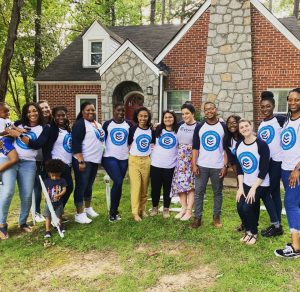 When Ethos Classical Charter School opens its doors on Wednesday, August 7, it will be the fulfillment of a four-year journey and the start of a new opportunity for more than 160 students living in the city of Atlanta and Fulton County.
When Ethos Classical Charter School opens its doors on Wednesday, August 7, it will be the fulfillment of a four-year journey and the start of a new opportunity for more than 160 students living in the city of Atlanta and Fulton County.
“It’s a dream that I’ve poured into for so long, it’s amazing that it’s finally becoming a reality,” says Ethos Classical Founding Head of School Emily Castillo León.
Ethos Classical Charter School is located in the Sylvan Hills neighborhood in Southwest Atlanta and will begin its first year by serving students in Kindergarten and the third grade. Ethos Classical plans to fully expand to a K-5 public charter school by the 2024-2025 school year. The school is authorized by the State Charter Schools Commission of Georgia and is focused on serving families in Atlanta and Fulton County through a classical education within a safe, structured and supportive community. However, when school leaders use the word “classical” they are referring to the school’s liberal arts focus rather than an emphasis on classical literature and history. Castillo León says the school’s curriculum is expansive and culturally relevant to its student population.
Castillo León says student literacy is major focus of Ethos Classical due to the abundance of research that shows its impact on long-term outcomes. Students will receive 210 minutes of daily literacy instruction and 140 minutes of text-rich mathematics instruction. The school’s students will also take part in a daily innovation lab.
The emphasis on literacy is crucial, because Castillo León says currently only four out of ten students can expect to read at grade level by the third grade in the highest-performing schools in the zip codes Ethos targeted for enrollment. That statistic is important because research has shown a student’s ability or inability to read by the third grade can determine their future trajectory. She says the school will have high expectations and wants to ensure its students are on the path to college and a life of opportunity.
“We believe that we’re creating a history-making school,” says Castillo León.
However, getting to opening day took hard work and perseverance. Ethos Classical applied to be a local charter school in Fulton County and Atlanta Public Schools. The school was denied by the APS and asked to withdraw its petition from the Fulton County Boards of Education. The school then reapplied to APS, but school board members did not take a vote on Ethos’ application and concerns about a lack of community support were raised. Ethos then submitted a petition to the State Charter Schools Commission of Georgia and was approved last July.
 Castillo León says community interest for the school has always been strong. For its inaugural school year, Ethos received more than 420 applications for 162 available seats for students, and she says the waitlist is continuing to build. She also says the 12 orientation sessions the school has held have been well attended.
Castillo León says community interest for the school has always been strong. For its inaugural school year, Ethos received more than 420 applications for 162 available seats for students, and she says the waitlist is continuing to build. She also says the 12 orientation sessions the school has held have been well attended.
“What we’ve known all along and have been working to elevate are the voices of families and parents. These numbers are the tangible representation of their support, which I do not believe is any different than it was four years ago.”
Despite family interest, Castillo León says the school may never have opened if it had not been for the passage of Georgia House Bill 787, which was championed by Georgia Charter Schools Association and members of its legislative coalition. The bill increased total funding for schools authorized by the State Charter Schools Commission by millions of dollars. Previously, commission-authorized schools were funded approximately 20 percent or more below traditional schools in Georgia.
“We would not have even applied to the State Charter Schools Commission without the more equitable funding that became a reality following the approval of HB 787,” says Castillo León. “It would have compromised our program in too many ways.”
Castillo León is thankful that the school’s lengthy journey to opening has come to close. She’s looking forward to the school making a difference in the lives of students and local families.
“We want our scholars to be curious and interested in the world with the academic foundation to pursue those interests and continue growing,” says Castillo León.